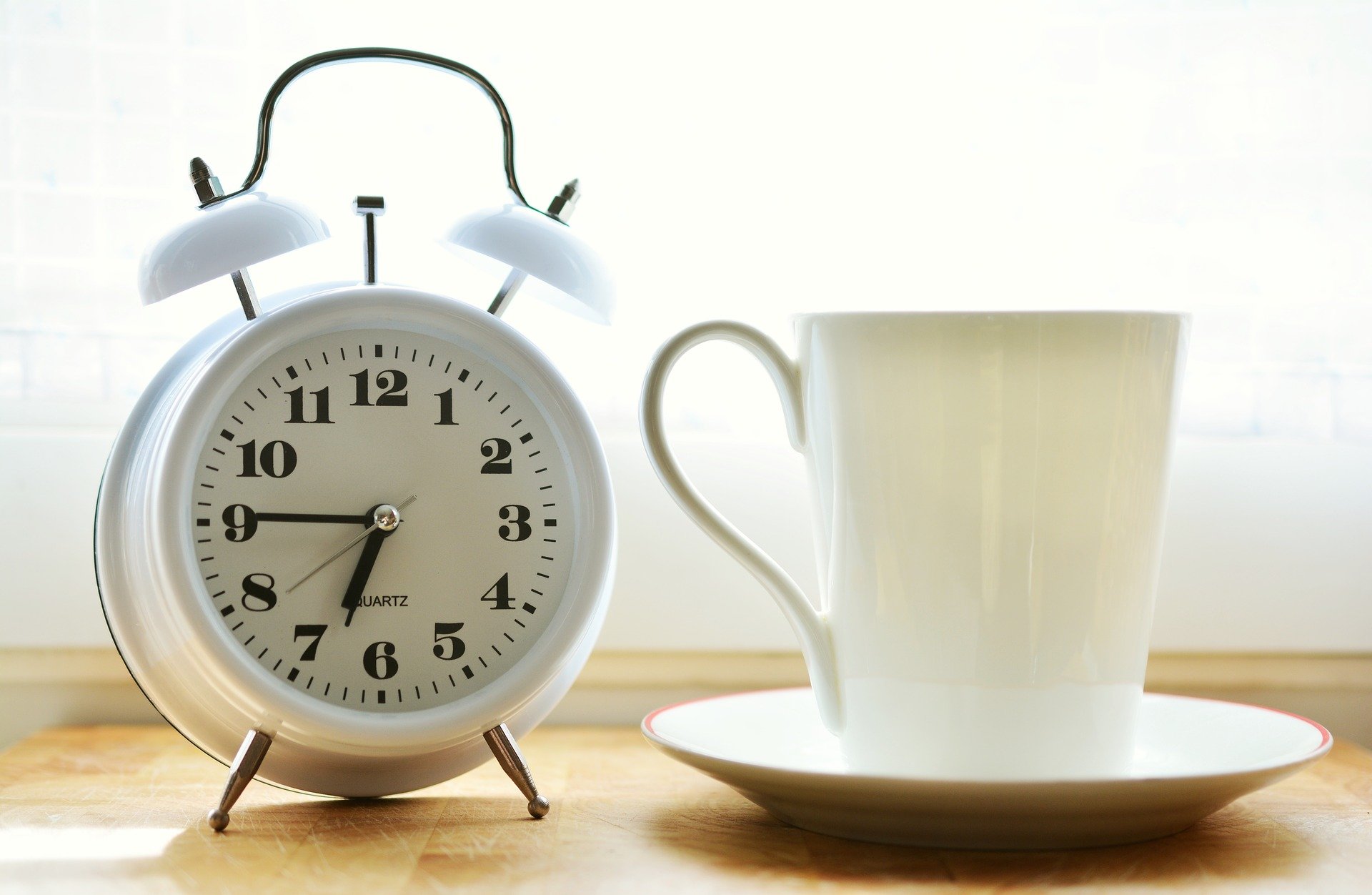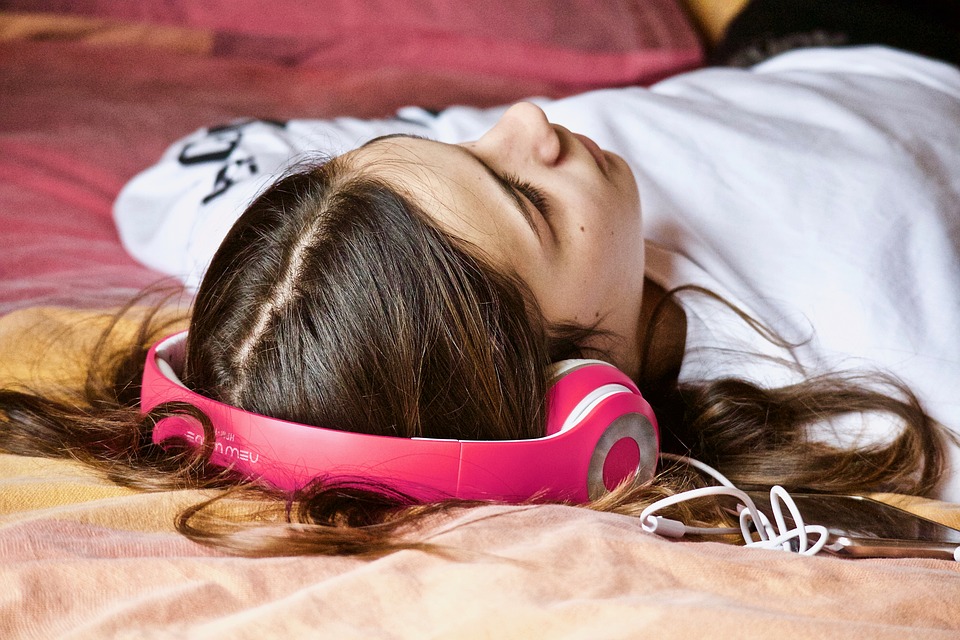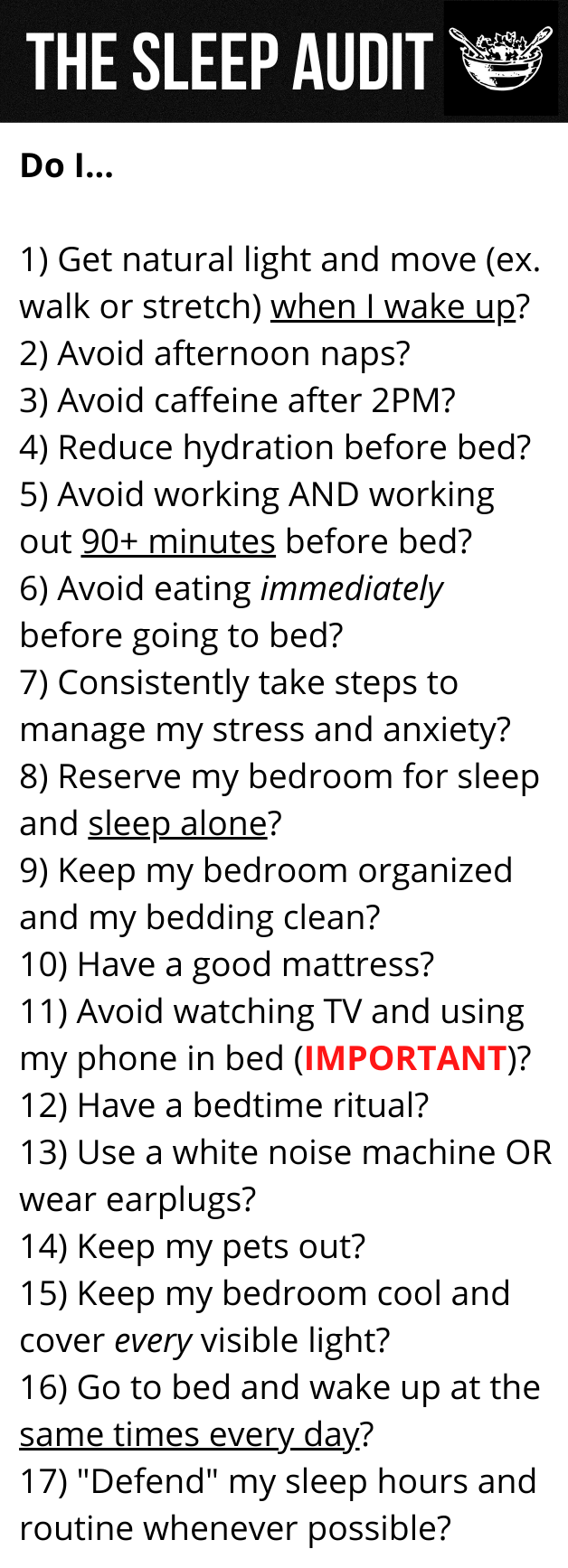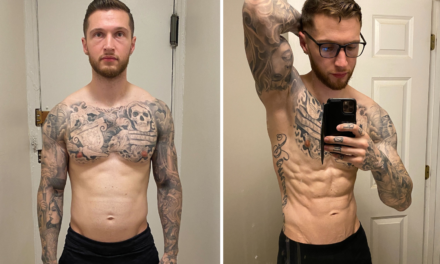This post may contain affiliate links, and as an Amazon Associate, Hercules Performance may earn from qualifying purchases.
Most people are shocked to find out how much sleep impact fat loss—both directly and indirectly.
It is, quite literally, the “magic pill” everybody’s looking for—but few people take the time to prioritize it… which is unfortunate, because a 2010 study found that sleep deprivation reduced weight loss by 55% and muscle retention by 60%.
In other words, if you don’t take your sleep “hygiene” (environment and habits) seriously, you’ll lose less weight, and more of what you lose will be muscle. This means you’ll be dieting for months longer than you need to.
Here’s a hypothetical example:
- Sally is 175 pounds and 30% body fat. She prioritizes sleep during her diet, and loses ten pounds: nine of which are fat (one is muscle). She’s now 165 pounds and 26% body fat.
- Amy is 175 pounds and 30% body fat. She doesn’t prioritize sleep during her diet, and loses 4.5 pounds: 1.35 of which are fat (3.15 is muscle). She’s now 171.5 pounds and 29.8% body fat.
Isn’t that crazy?
At this rate, it might take Amy 3-5+ times longer to achieve the same results as Sally,* all because she didn’t address her sleep hygiene.
*Comparing your pace of progress to somebody else’s is never wise, and is only being done here to show you the math.

Blowing off sleep hinders progress dramatically
Then there’s the indirect component: not only does sleeping poorly slow progress down, physiologically, but it:
- Spikes ghrelin (our hunger hormone) production
- Limits leptin (our fullness hormone) production
- Worsens decision-making capabilities
- Hinders workout performance and recovery
- Impairs cognitive function
So you’re more likely to experience cravings, give into them, and skip your workouts, all while performing poorly at work and feeling mentally fried. What a concoction!
The good news is, if you’re here, I know you have no interest in letting this continue to hold you back—so let’s discuss all twenty-four tips for sleep better (and accelerating fat loss):
1) Avoid napping after 2PM
If you can’t sleep at night, you “lose the right” to take afternoon naps. If and when you successfully avoid these, by the time nighttime rolls around, you’ll be dying to hit the hay.
2) Avoid napping altogether
This is coming the proud winner of Most Likely to Fall Sleep in Class, so I KNOW it’s hard to avoid them altogether—but this might be necessary if a 2PM cut-off isn’t helping.
3) Clean your clutter
If your bedroom looks like it was hit by a hurricane, I’m talking to you. You can’t expect your subconscious brain to not problem-solve and remain worked up if you’re sleeping in chaos.

It’s in your best interest to keep your room clean
4) Wash your mattress and sheets
I know it can feel like a hassle, but bacteria and germs quickly build up if you don’t, impacting your ability to get a good night’s sleep.
5) Invest in a high quality mattress
As I’m sure you’ve been told, you spend a third of your life here: so you might as well invest in a mattress you enjoy. Personally, I’ve found the Tuft & Needle Original Mattress to be life-changing.
It’s affordable, and every friend and family member who has crashed at my place has slept like a rock the first night they’ve tried it.
[Their pillow is incredible, too—and a cheap, easy upgrade (relative to a mattress).]
6) Schedule workouts strategically
One of my clients regularly books morning classes so he’s “forced” to practice good sleep habits—otherwise, he’ll feel crushed and skip class (and example of financial accountability).
If he follows through, he’s more than ready to go to bed when the time comes. You could say this has worked well for him:

It’s also worth mentioning that working out too late (ex. <90-120 minutes before bed) ignites your sympathetic (fight or flight) nervous system, making it harder to fall asleep and feel rested the next day.
7) “Front load” hydration
In general, ~80% of your hydration goal (which should be roughly half your bodyweight in ounces) should be reached by 5PM or so. Any later, and you risk late night bathroom breaks, and a harder time sleeping.

Liquids before bed are a bad idea
8) Avoid caffeine after 2PM
Technically, you can have it later, as it “only” stays in your system for about five hours. But, anecdotally, I’ve never had a client eliminate afternoon coffees and not sleep better—typically almost immediately.
9) Schedule dinner strategically
You’ll see mixed recommendations here, as some people say late dinners help you sleep, while others claim it hinders sleep.
Per usual, context matters, and leaner individuals are the ones who can “get away with” (and benefit from) higher carb, later dinners, whereas individuals at higher body fat percentages tend to have trouble sleeping after eating the very same meals.
(By the way, if you struggle with nighttime cravings and overeating, check out THIS article I wrote for Roman Fitness Systems.)
10) Make an effort to manage stress and anxiety
Naturally, this is easier said than done, but I’d love for you to try the following strategies (that relax the subconscious mind and encourage better sleep):
- First, there’s the Brain Dump, taught to me by Danielle Miller—which is particularly useful if your mind races at night. All you do is write down your stressors, thoughts, and ideas on an actual pen and paper before going to bed. Our brains compulsively repeat thoughts, so 2-3 thoughts can feel like two dozen if we don’t get them out
- Next, there’s the 4-7-8 Breathing Method, taught to me by mindfulness expert Natalie Saimeri. This technique gets us into a parasympathetic (rest and digest) state, and all need to do is inhale for four seconds, hold for seven, and exhale for eight. Then you repeat it 4-10 times (more is technically “better”)
For bonus points, focus on breathing into your stomach (not your chest). This is called diaphragmatic breathing, and it “multiplies” the 4-7-8 Breathing Method’s effectiveness.

Brain Dumps are highly underrated
It’s worth noting that neither of these strategies are magical, or guaranteed to work overnight. But again, I’ve never had a client implement both for 1-2+ weeks, regularly, and not sleep better.
11) Make every effort to stop working 90+ minutes before bed
I recognize how challenging this is, especially if you’re working from home—but you’re going to fight an uphill every single night if you don’t set boundaries and give yourself the opportunity to unwind. So it’s worth having a difficult conversation or two to ensure this happens.
12) Schedule relaxing activities before bed
These activities should be easily duplicated, no matter where you are and what your schedule looks like. Examples include:
- Stretching
- Mobility work
- Mindless TV
- Reading
- Journaling
- Meditation
- Meal prepping
- Playing with your dog
- Light cleaning and organization
- Breathing exercises

Reading fiction is my go-to
13) Take all non-sleep activities OUT of the bedroom
Your bedroom is not a media center, office, or playroom. If you’re not sleeping, you shouldn’t be in there. You need to condition your brain to associate the bedroom with one thing: sleep. Every time you break this “rule,” you make this harder for your brain to do.
14) Uninstall your bedroom TV
I’m hard-pressed to think of a more common, more harmful “norm” than having a TV in the bedroom. This screams, “I don’t value my health as much as forgettable Netflix shows.”
Seriously. it pushes back bedtimes, and destroys sleep quality. If you’re remotely interested in better health, and body composition, get it the hell out of your bedroom.
[If you can “only fall asleep with the TV on,” you need to reprogram your brain (over the course of 2+ weeks) to associate sleep with a non-electronic task—like reading a book or doing a breathing exercise.]
15) Have a consistent sleep schedule
Bonus points for having it be consistently early.
As sleep expert and author of Tired But Wired: The Essential Sleep Toolkit, Dr. Nerina Ramlakhan, explains, “The 90 minute phase before midnight is one of the most powerful phases of sleep, because it’s the period where the body is replenished.”
In other words, 11AM-6AM (seven hours) is more valuable than 12AM-8AM (eight hours). So plan accordingly, and stop sleeping in every weekend. It sets you up for a later bedtime and week of poor sleep.

In general, sleeping is a bad idea and sets you up to continue cycles of late bedtimes
16) Develop a rock solid ritual
As I alluded to earlier, an effective routine includes (A) tasks you can duplicate anytime, anywhere, and (B) a non-electronic activity immediately before sleeping. One of my favorites has been:
A) Mindless TV (outside the bedroom)
B) Brushing your teeth
C) Reading a fiction book (inside the bedroom)
D) Practicing the 4-7-8 Breathing Method (in bed)
This example can be done at home, on the road, or a friend’s house. It can be done in fifteen minutes, or two hours (depending on my schedule). This makes it highly sustainable and effective.
17) Keep a cool bedroom temperature
Danielle Pacheco (of SleepFoundation.org) says “…the best bedroom temperature is 65° Fahrenheit.” It helps your body release melatonin, a hormone that regulates sleep.
18) Black out your room
If you have a phone in your face, Kindle in your hands, and TV in the background, you won’t sleep as well as you could be. Exposure to light (especially blue light)—even dim, small ones—reduces melatonin.
19) Try a white noise machine
This is a great alternative for people who have conditioned themselves to fall asleep to a TV. Similar to an effective routine, specific noises can condition our brains it’s time to sleep.

Noise plays a major role in sleep conditioning
20) Try earplugs
If you have loud neighbors, a snoring partner, or neighbor’s dog keeping you up, earplugs can be effective. They’re not as uncomfortable as you might think (speaking from experience).
21) Buy an old school alarm clock
If you currently use your phone as an alarm, I’m talking to you. Bringing your phone into the bedroom produces half the issues on this list. You can’t tell me you’re serious about sleeping better if you’re doing this.
22) Put a pillow between your knees
Having a pillow between your knees helps you maintain a neutral spine, which can reduce existing back discomfort, or even help prevent it if you’re not currently experiencing any.
23) Keep your pets out
I know, I know: “She’s too cute! I could never.”
And trust me, I get it: I named my business after one of my dogs. But bringing your pets into the bedroom can produce a lot of the obstacles on this list: a lack of cleanliness, noise issues, a lack of physical space, irregular hours, etc.
24) Ruthlessly defend your sleep hours
At this point, you know sleeping better accelerates fat loss, maximizes muscle retention, and improves your health—so you can’t keep letting minor disruptions totally throw off your habits and routines. Even a modified routine trumps waving the white flag.
Lastly, to make this list even more actionable, I put together a checklist to run through if you’re struggling to sleep well and see the progress you want

Don’t hesitate to message me (HERE) if you have any questions on this checklist or anything you learned in today’s article.





